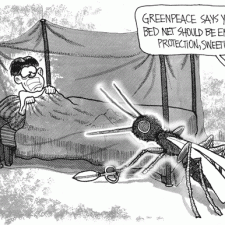Malaria
Enemies of humanity
Mosquitoes and uncaring environmental activists perpetuate poverty, disease and death Steven Lyazi After being infected again with malaria last July, I spent almost a month in a Kampala hospital. Paying for my treatment was extremely difficult, as it is for most Ugandan and African families. I was lucky I could scrape the money together. Many […]
We don’t need billion$ to prevent Zika
Controlling mosquitoes and preventing diseases requires smarter policies, not more billions Paul Driessen and Robert Novak The Zika virus is increasingly linked to serious neurological complications for pregnant women and microcephaly in newborns: smaller than normal heads and brains. It also affects areas of fetal brains that control basic muscular, motor, speech and other functions, leading […]
A bee in their bonnet
“Activists aren’t asking for investigation into these problems – which calls their science, sincerity and integrity into question. Their track record on DDT and malaria underscores this modus operandi. The activists get money, publicity, power and phony solutions – and end up hurting the very things (bees and people) they profess to care so much about.”

Malaria Atonement and Forgiveness
In this politicized age, many people have their own lists of folks who “ought to be seeking forgiveness.” I’m on several – including Greenpeace’s roster of “climate criminals”…
Rachel Carson was wrong!
And her alarmist claims about DDT cost millions of lives by Paul Driessen www.RachelWasWrong.org May 24, 2007 Environmental and other cultural myths often stand in the way of human progress. Even worse, they can result in devastating consequences. In fact, today millions of people around the world suffer the painful and often deadly effects of […]
Learn the facts about DDT and malaria
Valuable articles about pesticides and disease Congress of Racial Equality (CORE) November 2004 For further background about malaria and DDT, we recommend the following: Amir Attaran, Karen I. Barnes, et al., “WHO, the Global Fund, and medical malpractice in malaria treatment,” The Lancet, January 17, 2004. Eleven malaria experts criticize WHO and Global Fund for providing medicines […]
Letter to President Bush
Urging support for pesticides to control malaria by Roy Innis Congress of Racial Equality (CORE) November 2004 President George W. Bush The White House Washington, DC 20500 Dear President Bush: There is no more important human right than to live. Without life, all other human rights are irrelevant. Somehow, America’s and the world’s malaria control agencies […]
Country-club anxieties vs malaria victims
It’s time to remove life-threatening chemical phobias from laws and public policies by Paul K. Driessen November 2004 Millions of people may have gotten an eleventh-hour death-row reprieve when President Bush won re-election. His commitment to ending killer diseases in developing countries is rock solid – whereas his opponent’s environmental views often obstruct progress. […]
Myths and Facts about DDT
DDT saved lives without hurting people or the environment by Donald E. Waite Donald Waite October 2004 Dichlorodiphenyl-trichloroethane was first introduced for commercial use in the United States in 1947. It was the most effective of all of the synthetic insecticides, and the least costly to produce. As mentioned previously, it was widely used during […]
Senate Foreign Relations Committee studies malaria and pesticides
Two of the world’s foremost experts on malaria and other infectious diseases testified on October 6, 2004, before the US Senate Committee on Foreign Relations (Kansas Senator Sam Brownback presiding), on: “Neglected diseases in East Asia: Are public health programs working?” Robert Desowitz, Emeritus Professor of Tropical Medicine and Medical Microbiology at the University of […]
